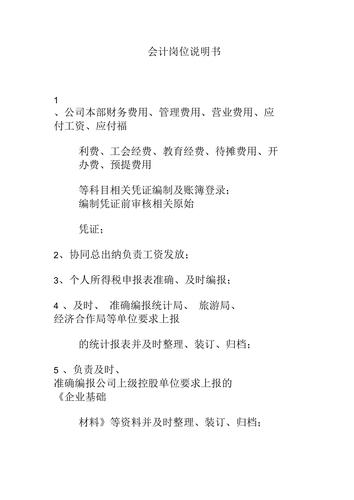旅游会计
Title: Understanding Compensation in Tourism Accounting
In the realm of tourism accounting, compensation varies depending on several factors including job role, experience, geographic location, and the specific sector within the tourism industry. Let's delve into the intricacies of compensation in this field and provide some guidance for those interested in pursuing a career in tourism accounting.
Salary Range and Factors Influencing Compensation:
1.
Job Role:
Compensation in tourism accounting can differ significantly based on the specific job role. Entrylevel positions such as accounting assistants or junior accountants generally receive lower salaries compared to seniorlevel roles like financial managers or controllers.2.
Experience:
Experience plays a pivotal role in determining compensation. As professionals gain more experience and expertise in tourism accounting, they become eligible for higherpaying positions. Fresh graduates might start with modest salaries, but as they accumulate experience, their earning potential increases.3.
Geographic Location:
The cost of living and demand for accounting professionals vary by geographic location. Major tourist destinations or cities with a thriving tourism industry may offer higher salaries to attract talent, whereas rural areas or locations with lower tourism activity might have lower compensation rates.4.
Sector and Company Size:
The sector within the tourism industry and the size of the employing company also influence compensation. Accounting roles in large hotel chains, cruise lines, or travel agencies may offer more competitive salaries and benefits compared to positions in small businesses or startups.5.
Skills and Qualifications:
Specialized skills, certifications, and qualifications can command higher salaries in tourism accounting. For example, professionals with certifications such as Certified Public Accountant (CPA) or Certified Management Accountant (CMA) may receive higher compensation than those without.Guidance for Aspiring Tourism Accountants:
1.
Education and Certification:
Pursue a bachelor's degree in accounting or finance to lay a strong foundation for a career in tourism accounting. Consider obtaining relevant certifications such as CPA or CMA to enhance your credentials and marketability in the field.2.
Gain Experience:
Seek internships or entrylevel positions in tourismrelated businesses to gain practical experience and exposure to the industry. Proactively seek opportunities to learn about tourismspecific accounting practices and software used in the field.
3.
Networking:
Build a professional network within the tourism industry by attending industry events, joining professional associations, and connecting with professionals on platforms like LinkedIn. Networking can open doors to job opportunities and provide valuable insights into industry trends.4.
Stay Updated:
Stay abreast of developments in both the accounting profession and the tourism industry. Continuously upgrade your skills, stay informed about changes in accounting standards, and understand how emerging trends in tourism may impact accounting practices.5.
Negotiation:
When considering job offers or salary negotiations, research industry standards and benchmark salaries for your position and level of experience. Be prepared to articulate your value proposition and negotiate for fair compensation based on your skills, qualifications, and the demands of the role.In conclusion, compensation in tourism accounting is influenced by various factors including job role, experience, geographic location, sector, and skills. By understanding these factors and following the guidance provided, aspiring tourism accountants can position themselves for a rewarding career with competitive compensation in this dynamic industry.
版权声明
本文仅代表作者观点,不代表百度立场。
本文系作者授权百度百家发表,未经许可,不得转载。








